Photographs: Reuters Mihir S Sharma in New Delhi
For Nandan Nilekani, his job must seem like a constant exercise in damage control. "The difference," he tells Mihir S Sharma, "between life in the private sector and life here is that there nobody questions your motives. Everyone knows what you are out to do."
On the critics who suspect the Unique Identification (UID) of being a sneaky attack on entitlements he says: "Whether you choose to give rice, or choose to give cash, we are giving you plumbing. Once you get into speculative motives [for why the UID exists], you can go anywhere."
He definitely seems to feel scrutinised. The Taj's House of Ming -- which he picks over SMS without much apparent thought -- has a distinctly unlovely interior, moderated only by the presence of a few pleasant, highly-visible tables overlooking the hotel's green lawns. Nilekani looks at them doubtfully, and chooses instead a secluded corner table. It takes him a while to relax, and to stop looking warily over your shoulder.
...
Why is Nandan Nilekani talking about plumbing?
Image: UID card holder Ranjna Sonawane with her son HiteshPhotographs: Uttam Ghosh/Rediff.com/File photo
With my first question, he launches, naturally, into damage control. The UID's making headlines for the wrong reasons, he says. After results from pilot programmes, criticism surfaced that it wasn't recognising fingerprints well enough.
A 95 per cent success ratio, the headlines screamed, wasn't OK. That misses the point, Nilekani insists: "There are different benefits. There is the power to enrol anywhere. Suppose there's someone from eastern India working in Gurgaon. She can enrol with everybody else."
The other immediate benefit is de-duplication: "The biometrics ensure uniqueness, which is the real power of it... Imagine a state spends Rs 3,000 crore (Rs 30 billion) on a scholarship scheme... If Aadhaar de-duplication removes 15-20 per cent of the roll, those are savings right there!" Repeated across such rolls, "that itself would pay for the UID".
...
Why is Nandan Nilekani talking about plumbing?
Photographs: Reuters
The menu hasn't yet come, and already we're deep in wonky detail. I press him about the technical problems around verification. He explains that they're "doing a lot of work to improve the reliability of that.
We have something called best-finger detection, which identifies which of your fingers is the best. Then we have two-finger authentication. We also have non-biometric," allowing for people to bring identity papers.
"And, finally, the application will always have an override -- the operator [conducting authentication] can say he's comfortable that this is the same guy" -- on a predetermined fraction of occasions, at least. I ask him about iris-based authentication, which is even more controversial. "It's not a mature technology," he says firmly. "But it should be ready for use soon. We're being cautious."
...
Why is Nandan Nilekani talking about plumbing?
Photographs: Jagadeesh Nv/Reuters
The steward finally arrives. I receive an education in how Important People are treated in restaurants. I'd rather be unimportant: mainly because it is assumed Important People are Too Busy to Order.
The steward asks us if we want vegetables, chicken or meat, and tells us he'll do the rest. Before I can interpose a panicked reply, Nilekani says: "dim sum." The steward rushes off, and brings us a random selection.
They're terrible: undercooked and flavourless. Nilekani calls the steward over, and asks for the restaurant's hottest sauce. The steward points to one on the table. Nilekani grins as he puts a generous dollop on his plate: "I'm sure you're going to mention this."
...
Why is Nandan Nilekani talking about plumbing?
Image: UID process- equipment used for taking picture of irisPhotographs: Courtesy, Wikimedia Commons
He patiently munches his chilli-smeared dim sum as I ask him about the security problem. He refuses to get drawn into a discussion of the National Population Register (NPR) and the efforts by the home ministry to torpedo his project.
He smiles beatifically and says: "Everyone has already talked about that problem. It's behind us." When I say the NPR's priorities have poisoned the UID's approach, with residents being required to bring paperwork to sign up – the very opposite of the original conception – Nilekani adds, "There must be a balance between security and inclusion." He sounds singularly unemphatic.
He's more at home talking about how lightweight the UID project is actually supposed to be. "We're building plumbing," he repeats, when talking about activists' concerns about the UID turning into a Big Brother panopticon-style mechanism, "it's up to others to use it."
...
Why is Nandan Nilekani talking about plumbing?
Photographs: Devjyot Ghoshal
It isn't just the UID he's working on, he reminds me: there's another programme, with Sam Pitroda, to link all India's panchayats with fibre-optic cable, over the next two years. It's a ridiculously optimistic timeframe, and I tell him so.
He shrugs. I worry that he may have decided that, in Lutyens' Delhi, unrealistic timeframes are essential for survival. So I remind him that this year's entire Budget depends on him. The FM mentioned him by name several times in his Budget speech: is the pressure on?
He agrees, results are being demanded, and he doesn't have time for more pilots: "We have to show this thing at scale." The UID's rolling out in 50 districts in a few months. "The next one year is crucial for us."
...
Why is Nandan Nilekani talking about plumbing?
Image: Aadhaar cnetrePhotographs: Courtesy, Wikimedia Commons
Meanwhile, I've decided I want the spare ribs. I ask him if he wants lamb or chicken. "Some lamb, sure," he says -- till the waiter gets there, at which point he tells him firmly: "the shredded lamb with crushed black pepper." He gives the word "pepper" an adoring, south-Indian roll as he says it.
"One issue is connectivity. Our view is connectivity can only get better." It's the same forward-looking attitude he had when I complained that people were being turned away from UID enrolment centres because of the NPR's requirements -- "it's a continuing process, more and more people will be enrolled."
Many ministries -- Jairam Ramesh's rural development in particular – complain that mobile connectivity just isn't good enough. They want old-fashioned, manipulable smart-cards. Nilekani points out the UID uses 2G networks, and those cover most of the country, so "connectivity will go away as a problem".
...
Why is Nandan Nilekani talking about plumbing?
Photographs: Reuters
And then, of course, there's that national fibre-optic grid plan. Altogether, it's a "tactical and not a strategic issue". Trying to describe the strategic implications, he heads straight back to the plumbing metaphor. "The plumbing of how money reaches the villages is what is difficult."
But plumbers only have to navigate sewers, not Lutyens' Delhi. In government, you have to navigate "very different points of view and agendas and motivations... far more complex than in the private sector, where you are answerable to your management team, your board, your shareholders, maybe some analysts. Here you are 'answerable' to so many people, and they may not even agree on what they want... The environmental overheads here are higher. A substantial amount of your time and energy goes on that".
I brood over this discouraging interpretation as our food arrives. It, too, is a disappointment. The ribs are chewy -- though I manage to finish them -- and the "burnt ginger" fried rice tastes, frankly, like any other fried rice, only worse.
...
Why is Nandan Nilekani talking about plumbing?
Suppose, I ask, a manager – comfortably off, 50ish, interested in policy -- wants to leave the private sector. Should government be an option? "Absolutely," he says. I tell him nobody will believe that. He laughingly explains: "Increasingly, the state's capacity for driving transformation, for change, requires attracting such people -- so there will be roles created for them."
I'm still doubtful. He's less cynical than most Indian managers, I say. He explains India's state has a special role -- we need to create big public goods and enhance capacity. "I've always been interested in change... This is a different class, a different league of change."
His love affair with transformation had certainly been on display in his book, Imagining India. That was, he said, an attempt to create a "framework of ideas" for change. Haven't we moved backward since then? "I don't look backward," he says.
...
Why is Nandan Nilekani talking about plumbing?
Photographs: Rajesh Karkera/Rediff.com
"Always look forward." I immediately ask if he has any idea what he'll do once he's done with the UID, but he refuses, again, to speculate.
Well, what would he revise about that book? "I was more optimistic then than now," he says, looking around at the Taj's well-fed lunchers. He seems about to add something depressing about his time in Delhi. And then said: "It should have been much shorter... I overcompensated because I was concerned people would ask 'who is this guy to be writing about this?'"
Nilekani is a much more restrained eater than I am -- and I struggle to finish the ribs, and give up on the lamb, which is oversalted. The unfinished food stays on the table as we talk, and while I pay the hefty bill. As we walk out, I notice most un-Lutyens' Delhi behaviour from Nilekani: he strides through the Taj's lobby, crowded with familiar-looking power lunchers, without glancing right or left.

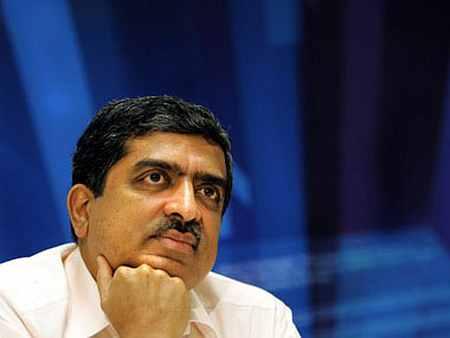
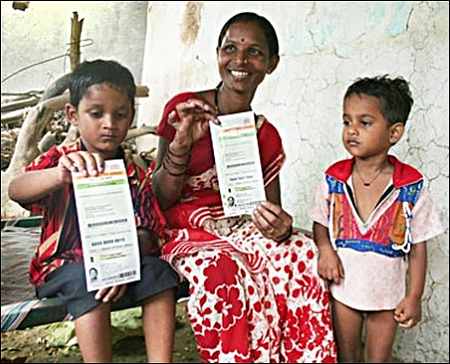
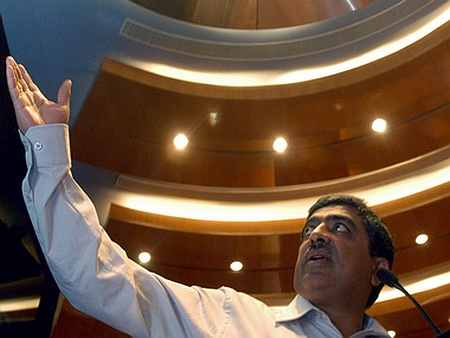
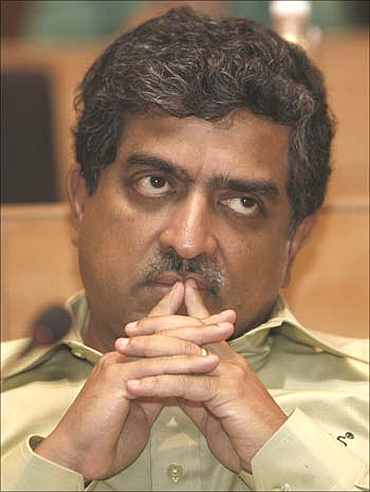


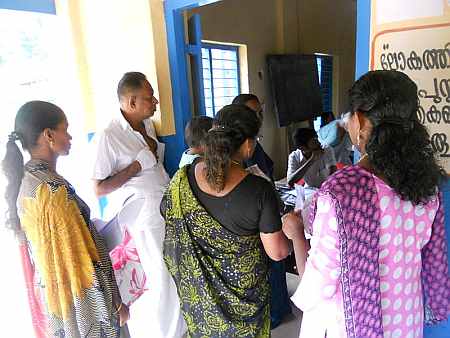
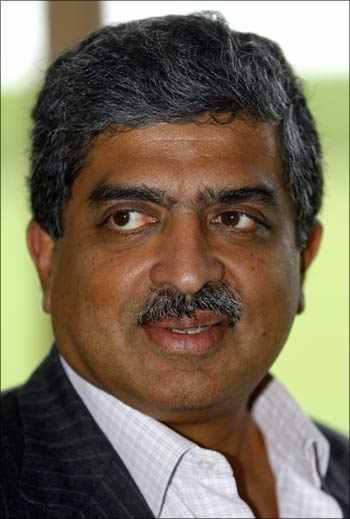

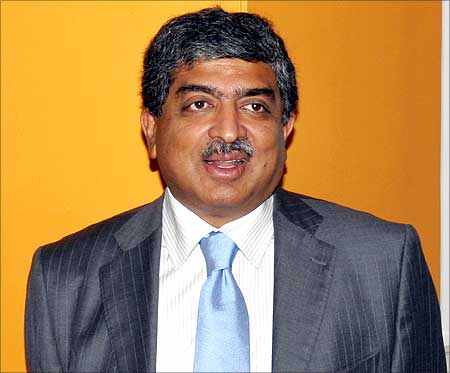

article